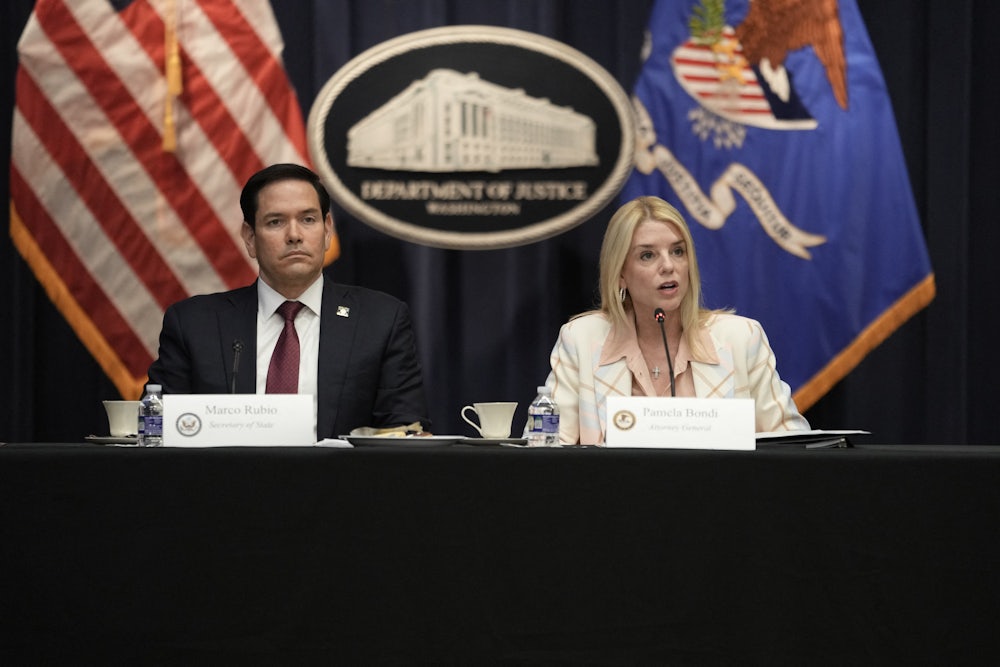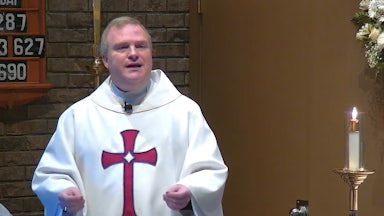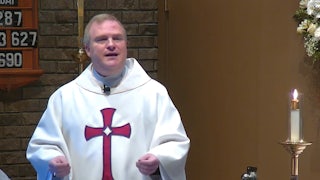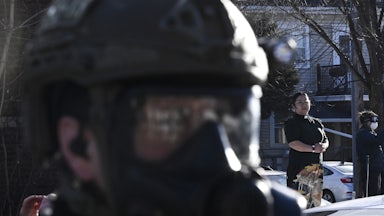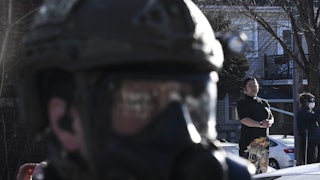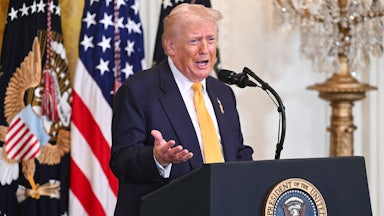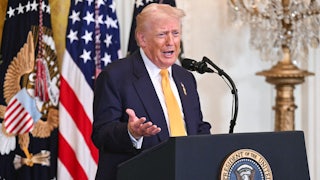On April 22, Attorney General Pam Bondi hosted the first meeting of the “Task Force to Eradicate Anti-Christian Bias in the Federal Government.” Attendees included the secretaries of Defense, State, Homeland Security, Health & Human Services, Veterans Affairs, Education, and Labor, as well as over a dozen high-ranking officials in the administration. Those attending didn’t seem to be bothered by the fact that no evidence of such widespread bias exists. That’s because they weren’t there to solve a problem but to create one. The Task Force claimed to be standing up for “religious liberty,” but its real goal is to amplify the persecution complex of the Trump administration’s Christian nationalist allies and base—and then to use groundless claims of religious discrimination as the basis for the suppression of dissent.
Less than a week later, an incident at the U.S. Capitol made clear that the Trump administration has zero interest in promoting “religious liberty.” As the Reverend William Barber and other faith leaders opposed to Republican budget cuts gathered to pray at the Capitol Rotunda, they were swiftly surrounded by Capitol Police officers, one wearing a “crime scene” vest. The press was expelled from the building, and the pastors were arrested.
You would think that a Task Force concerned with anti-Christian bias would take an interest. But the administration appears to have nothing to say. The problem for the Reverend Barber and his fellow pastors is that they would seem to be the wrong kind of Christians. Right-wing pastor Sean Feucht has “filled the US Capitol Rotunda with worship time and time again for the last 4 years,” in his own words, and yet he has never been arrested or detained. He, apparently, is the right kind of Christian.
In the United States, attacks on Christians continue to occur at far lower rates than those targeted at other religious groups, including Jews, Muslims, and Sikhs. The Task Force’s exclusive focus on Christian victims exposes its rhetoric about defending “religious liberty” as transparently insincere.
Instances of alleged “anti-Christian bias” cited in the executive order that established the Task Force are even more revealing. The first and most prominent example of bias provided is the conviction of anti-abortion activists in connection with their violations of laws intended to protect the rights of individuals seeking health care services—a group that Trump pardoned in his first days in office. The second example is an internal FBI memo from 2023 that identified certain extremist Catholic groups as potential terror threats—even though an internal FBI review of the memo in 2024 concluded that there was no evidence the memo targeted or resulted in the targeting of anyone on account of their religious beliefs, Catholic or otherwise.
The irony of “anti-Christian bias,” as the Trump administration defines it, is that it is not, in fact, directed at Christians per se. After all, the Reverend Barber, like many American Christians, appears to anchor a commitment to equality, social justice, and concern for the poor in his faith. Rather, the alleged victims of bias are those Christians who endorse reactionary positions in the culture wars and support Trump’s agenda unconditionally.
The other fact about this misnamed “anti-Christian bias” is that it is indistinguishable from sincere efforts to protect individual rights against discrimination on the part of this subset of people who identify as Christian. If you try to prevent a political activist who holds this preferred identity from discriminating against or infringing on the rights of people of whom they disapprove—precisely what the anti-abortion activists were doing—then you, not they, are allegedly engaging in “bias.” This is what “religious freedom” has come to mean: privilege for conservative Christians alone, including the freedom to harass or discriminate.
But there is still more to make George Orwell proud. The most insidious aspect of this “anti-Christian bias” program is that it refers not primarily to actual crimes, such as acts of discrimination or violence, but to thought crimes. The reason the administration can’t let go of the FBI memo on terrorist threats from “radical-traditionalist” Catholic extremists is not that it proves discrimination—it does not—but that it serves as evidence that someone somewhere in the FBI had a negative thought about some reactionary people who happen to identify as Catholic.
The thought-crime focus of the Task Force is evident in the memo that Veterans Affairs circulated to its staff immediately after the meeting. That email specifically calls on employees to report on “any informal policies, procedures, or unofficial understandings hostile to Christian views.”
So, if your office holds the “unofficial understanding” that LGBTQ people or the nonreligious or progressive Christians, for example, should have equal rights—an understanding clearly hostile to the views of the subset of Christians who believe that “woke Christians,” the nonreligious, and LGBTQ Americans deserve no such equal protections—do you rat out the office for rampant anti-Christian bias? If your agency promotes racial equality, concern for the poor, or the protection of the earth from climate change—views apparently at odds with the ideas of those who characterize “DEI” as an “ungodly agenda,” who promote “biblical economics” or regard environmentalism as a “cult of the green dragon” and, conveniently for the fossil fuel interests that fund many of their operations, deny the reality of climate change—should you turn them in too?
Federal employees will have no trouble picking up the real message of the Task Force to Eradicate Anti-Christian Bias, even though one hopes that they will have the strength to resist. The message is that one political ideology—the one that the administration mislabels as “Christian”—occupies a place of special privilege in the United States. If anything you say or do can be construed as “hostile” to this ideology, you will face the coercive power of the federal government.
This kind of thought-crime demagoguery, which panders to the persecution complex of Trump’s Christian nationalist base, has been tremendously successful. A 2023 survey, conducted by the Survey Center on American Life, reported that nearly 60 per cent of white evangelicals in America say they face “a lot” of discrimination. Other surveys show that Republicans and those who lean Republican now say that discrimination against white people and evangelicals is more common than discrimination against Black people.
To make people feel persecuted, it turns out, you don’t actually have to persecute them. You just have to tell them, over and over again, that they are being persecuted. The supposed “war on Christmas” operates on the same principle as “the stolen election”: You repeat the lie until you believe that it is true.
The public has little difficulty in figuring out the real message too: that there is one group in America that is authentically American and deserving of rights and privileges. The autocrat in power will defend them and their tribe against all others who fail to conform. If those “others” step out of line, they will be punished, no matter what the law and the Constitution says.
Majoritarian grievance is the energy drink of all fascist movements, but the Task Force is more than just a propaganda stunt to shore up the base. It is weaponizing the constitutional guarantees on the free exercise of religion. Trump’s Task Force is turning a legitimate concern—that no one should suffer discrimination on the basis of belief—into a pseudo-legal foundation for the prosecution of those whose thoughts are “hostile” to the ideology of the regime and its preferred, protected class of people. This is how it starts.
